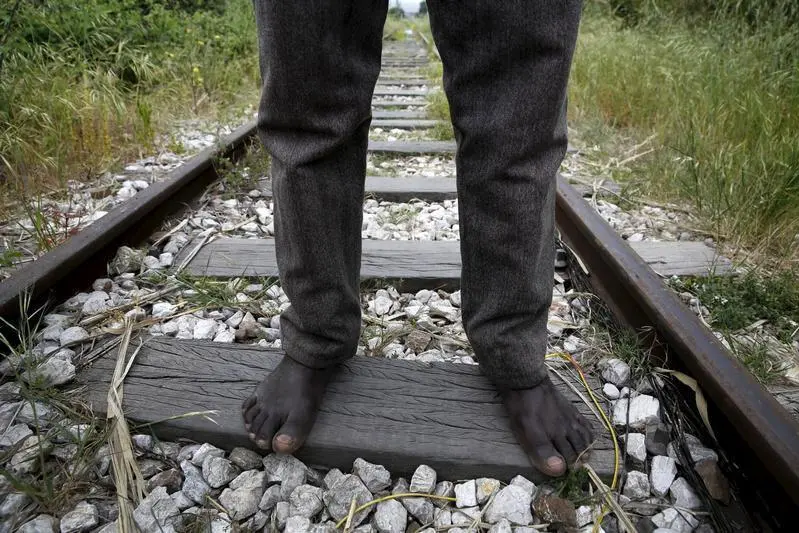PHOTO
By Michelle Nichols
UNITED NATIONS, June 26 (Reuters) - The United States has proposed six rival commanders from South Sudan be the first people blacklisted by the United Nations Security Council for threatening the peace and stability of the world's newest state.
The council's 15-member South Sudan sanctions committee operates by consensus, so if there are no objections by 3 p.m. EDT (1900 GMT) on Wednesday, a global travel ban and asset freeze will be imposed. Britain and France co-sponsored the proposal.
According to the proposal, seen by Reuters on Friday, the government leaders targeted are: Major-General Marial Chanuong Yol Mangok, commander of President Salva Kiir's guard unit; sector one commander Lieutenant-General Gabriel Jok Riak; and third division commander Major-General Santino Deng Wol.
On the rebel side, the men named are: Major-General Simon Gatwech Dual, chief of general staff for the opposition forces; Major-General James Koang Chuol, commander of the opposition special division; and Major-General Peter Gadet, the deputy chief of staff of operations for the oppositions forces.
South Sudan plunged into civil war in December 2013 when a political crisis sparked fighting between forces loyal to Kiir and rebels allied with his former deputy Riek Machar. The conflict has reopened ethnic fault lines that pit Kiir's Dinka people against Machar's ethnic Nuer forces.
Several ceasefires have been agreed but broken. Talks to try to end the conflict in the world's youngest country, which seceded from Sudan in 2011, are set to resume in mid-July.
In the sanctions listing proposal, government commander Chanuong is accused of leading "the slaughter of Nuer civilians in and around Juba, many who were buried in mass graves." One grave was purported to contain 200 to 300 civilians.
Rebel commander Gadet's forces are accused of targeting "civilians, including women, in April 2014 during an assault on Bentiu, including targeted killings on the basis of ethnicity."
The Security Council has long threatened to blacklist anyone undermining security or interfering with the peace process in South Sudan. Kiir said in March that the threat of international sanctions would not keep him from retaliating against his rival.
The United States and the European Union have already imposed sanctions on some rival commanders.
The United States supported Kiir until it lost confidence in 2013. Washington hoped he could oversee a stable, oil-producing, majority Christian state allied to the West in contrast to neighboring Muslim-led Sudan, which is hostile to Washington.
Thousands have been killed and hundreds of thousands displaced in the fighting.
(Reporting by Michelle Nichols; Editing by Richard Chang) ((michelle.nichols@thomsonreuters.com; +1 212 355 6053; Reuters Messaging: michelle.nichols.reuters.com@reuters.net; Twitter: @michellenichols))
Keywords: SOUTHSUDAN UNREST/UN SANCTIONS
UNITED NATIONS, June 26 (Reuters) - The United States has proposed six rival commanders from South Sudan be the first people blacklisted by the United Nations Security Council for threatening the peace and stability of the world's newest state.
The council's 15-member South Sudan sanctions committee operates by consensus, so if there are no objections by 3 p.m. EDT (1900 GMT) on Wednesday, a global travel ban and asset freeze will be imposed. Britain and France co-sponsored the proposal.
According to the proposal, seen by Reuters on Friday, the government leaders targeted are: Major-General Marial Chanuong Yol Mangok, commander of President Salva Kiir's guard unit; sector one commander Lieutenant-General Gabriel Jok Riak; and third division commander Major-General Santino Deng Wol.
On the rebel side, the men named are: Major-General Simon Gatwech Dual, chief of general staff for the opposition forces; Major-General James Koang Chuol, commander of the opposition special division; and Major-General Peter Gadet, the deputy chief of staff of operations for the oppositions forces.
South Sudan plunged into civil war in December 2013 when a political crisis sparked fighting between forces loyal to Kiir and rebels allied with his former deputy Riek Machar. The conflict has reopened ethnic fault lines that pit Kiir's Dinka people against Machar's ethnic Nuer forces.
Several ceasefires have been agreed but broken. Talks to try to end the conflict in the world's youngest country, which seceded from Sudan in 2011, are set to resume in mid-July.
In the sanctions listing proposal, government commander Chanuong is accused of leading "the slaughter of Nuer civilians in and around Juba, many who were buried in mass graves." One grave was purported to contain 200 to 300 civilians.
Rebel commander Gadet's forces are accused of targeting "civilians, including women, in April 2014 during an assault on Bentiu, including targeted killings on the basis of ethnicity."
The Security Council has long threatened to blacklist anyone undermining security or interfering with the peace process in South Sudan. Kiir said in March that the threat of international sanctions would not keep him from retaliating against his rival.
The United States and the European Union have already imposed sanctions on some rival commanders.
The United States supported Kiir until it lost confidence in 2013. Washington hoped he could oversee a stable, oil-producing, majority Christian state allied to the West in contrast to neighboring Muslim-led Sudan, which is hostile to Washington.
Thousands have been killed and hundreds of thousands displaced in the fighting.
(Reporting by Michelle Nichols; Editing by Richard Chang) ((michelle.nichols@thomsonreuters.com; +1 212 355 6053; Reuters Messaging: michelle.nichols.reuters.com@reuters.net; Twitter: @michellenichols))
Keywords: SOUTHSUDAN UNREST/UN SANCTIONS





















